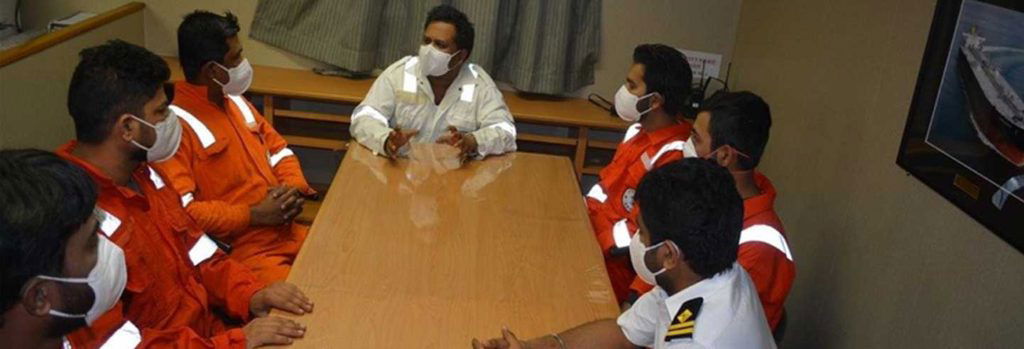March 26th , 2020

The organisation of collective crew changes at key hub ports by ship managers and owners has the potential to solve the seafarer welfare crisis currently threatening global supply chains, believes Captain Rajesh Unni, Founder and CEO of leading Singapore-based ship manager Synergy Group, which employs over 12,000 seafarers on more than 300 vessels.
“I believe that collective, carefully managed crew changes at designated ports could help us tackle this crisis,” said Captain Unni.
“Seafarers returning home would have to undergo a 14-day quarantine period, of course. And those joining ships would need to pass a mandatory medical, including a Covid-19 test.
“Even if Covid-19 infections subside, which we all hope they will do, putting a plan in place now will be good preparation for the future.”
Over 1.6 million seafarers keep the world’s merchant fleet at sea, delivering fuel, medicines, food and equipment to those countries where large portions of the population are currently under curfew as governments try to contain the coronavirus pandemic.
However, as a number of organisations including Human Rights at Sea and the International Chamber of Shipping (ICS) have made clear in recent days, the closure of borders and strict quarantine rules are preventing crew changes from being completed in accordance with employment contracts and international conventions including the Maritime Labour Convention.
The upshot is that thousands of seafarers are now stuck on ships unable to return home. Moreover, for those stranded at sea, conditions are deteriorating rapidly.
“In many ports crew changes are simply prohibited,” said Captain Unni. “Elsewhere, vessels from some origins are now forced to remain at anchorage in quarantine for up to 14 days before they can dock.
“To make matters worse, it is also becoming increasingly difficult for crew to stock up on fresh fruit and vegetables such are the restrictions placed on port agents and captains.
“And how are seafarers with medical conditions supposed to get treatments if they can’t leave the vessel?
“This is a safety issue and it’s a mental health issue.
“Seafarers are key workers and they need to be treated with more respect and support. People in any profession should have the right to return home and see their families.”
To facilitate the continuation of world trade without interruption and to protect the human rights and mental well-being of seafarers, Captain Unni is now reaching out to like-minded stakeholders to expedite collective crew changes.
“We have already spoken to a number of leading ship owners and they agree this is a positive way forward,” he said. “We have also identified a number of ports where we think this can be actioned.
“We are now approaching leading shipping organisations and have contacted the IMO about how we can move this forward with the utmost haste.”
In any given month around 100,000 seafarers reach the end of their employment contracts and are repatriated, according to ICS.
“This is a time bomb,” said Captain Unni. “Even under normal circumstance, seafaring is stressful and involves spending long periods of time away from friends and family.
“Right now, in the midst of a pandemic when of course people are anxious, thousands are stuck at sea or stranded around the world waiting to join vessels but unable to do so.
“I have heard the argument that seafarers are safest at sea waiting this out. But nobody knows how long this pandemic will last. Doing nothing is not a plan.
“The inability to enact crew changes is a threat to the mental health of seafarers. They can’t stay at sea indefinitely.
“This also has the potential to disrupt the global supply chains millions are relying on in these terrible times. Seafarers will only put up with this uncertainty and poor treatment for so long, and rightly so.
“We all need to come together and find solutions that help our seafarers and protect world trade.”


